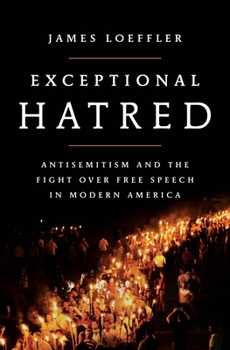Exceptional Hatred: Antisemitism and the Fight Over Free Speech in Modern America
A leading historian's revelatory exploration of antisemitism in the United States--from 1940s anti-Jewish riots until today--showing that it has long served as a frontline in our wars over freedom of speech and the nature of American liberalism
Few issues are as vexed today as antisemitism and free speech. There is scarcely an arena--college campuses, congressional hearings, immigration courtrooms, social media platforms--where we are not polarized over what counts as antisemitism, which speech is protected by the First Amendment, and what the law should do about hatred. At a time of political crisis, antisemitism has become a point of ideological obsession. None of this is new. In a sweeping history of ideas and law, James Loeffler recovers the forgotten roots of our contemporary turmoil. From two antisemitic riots in postwar Chicago to a neo-Nazi march in 1970s Skokie, Illinois, and the Charlottesville Unite the Right rally in our own time, Loeffler explores the ways in which America's courts have grappled with hatred, freedom, and the tensions at the heart of liberal democracy: Are some hatreds more dangerous than others? Is tolerating hate speech the price we must pay for free speech? And can liberalism ever make good on its promise to end hatred through law? Confronting these questions, Exceptional Hatred restores a missing history of hate speech, antisemitism, and the law, one that points to how we might protect difference without surrendering our principles of equality and freedom.Format:Hardcover
Language:English
ISBN:1250806070
ISBN13:9781250806079
Release Date:August 2026
Publisher:Metropolitan Books
Length:384 Pages
Weight:1.00 lbs.
Dimensions:1.0" x 6.1" x 9.3"
Related Subjects
History Political Science Politics & Social Sciences Religion Religion & SpiritualityCustomer Reviews
0 rating





